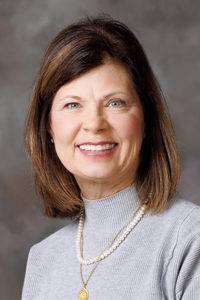Bill would ban synthetically derived THC products
Delta-8 and similar hemp-derived products would be prohibited in Nebraska under a proposal considered by the Judiciary Committee Feb.1.

LB999, introduced by Sen. Teresa Ibach of Sumner, would restrict the sale, possession and consumption of hemp-derived cannabinoid products that contain isomers, acids and salts, such as delta-8 or delta-10.
The federal 2018 Farm Bill legalized hemp production with 0.3% or less Delta-9 THC, Ibach said, but other cannabinoids like delta-8 and delta-10 were not limited, thus creating a loophole for businesses to sell them. Currently, these products are not subject to state-regulated testing or purity requirements, she said, which prevents purchasers from knowing exactly what they’re consuming.
“While a product could be advertised as delta-8 or delta-10, these products could — and most likely do — contain chemicals, compounds and other impurities that are not listed on the label,” Ibach said.
LB999 also would transfer regulatory oversight of hemp cultivation in Nebraska from the state to the U.S. Department of Agriculture and terminate the Hemp Promotion Fund, among other provisions.
Nebraska Attorney General Mike Hilgers testified in support of the measure. Nebraska retailers who sell delta-8 and similar products are operating in a “perceived loophole,” he said, that does not exist within state law. Investigations undertaken by his office found that many retailers offered products that are “clearly illegal,” he said.
“They’re making a little bit of a bet that authorities, like my office or others, won’t be able to take the time, the energy or the money to be able to enforce the law,” Hilgers said.
Also testifying in support of the measure was Sarpy County Sheriff Jeff Davis. In 2023, the narcotics unit purchased products from various Sarpy County retailers that were sent in for testing, he said.
“A few months later, we were notified that several products had tested positive for delta-9 with a THC content 30 or 40 times greater than what was allowed by law, which is 0.3%” Davis said.
After these findings, products from stores in Omaha, Lincoln, Grand Island and Ogallala also were also tested and found to be illegal, he said.
Andrea Holmes, an organic chemist and president of the Nebraska Healthy Alternatives Association, testified against the proposal. Thousands of people across the state use hemp products to improve their health and quality of life, she said, and most retailers are complying with state law by offering products that are clean, professional and sourced from trusted manufacturers.
“A ban on hemp products would not only put these reputable businesses out of commission, but also prevent adults in Nebraska [from accessing] safe and tested products that they freely choose to use in their daily lives,” Holmes said.
Also opposing the bill was Sean Norris, who spoke on behalf of MC Nutraceuticals, a cannabinoid distributor. An estimated 40 million U.S. adults tried delta-8 products in the last year, he said, and many people who use hemp-derived products report that the therapeutic benefits are greater than those found in traditional medicines, including opioids.
Nelam Millatmal testified against the proposal on behalf of The Cannabis Factory, a Nebraska-based retailer with 16 stores throughout the state. The Cannabis Factory sells products only from reputable distributors licensed by the USDA, she said, which are tested in DEA-certified labs and arrive in stores with certificates of analysis.
More than 100,000 customers are enrolled in the company’s loyalty program, Millatmal said.
“They include, but are not limited to, retired military personnel, teachers, chemo patients, law enforcement officers — all of whom find benefits for health concerns with our products,” she said.
The committee took no immediate action on LB999.

